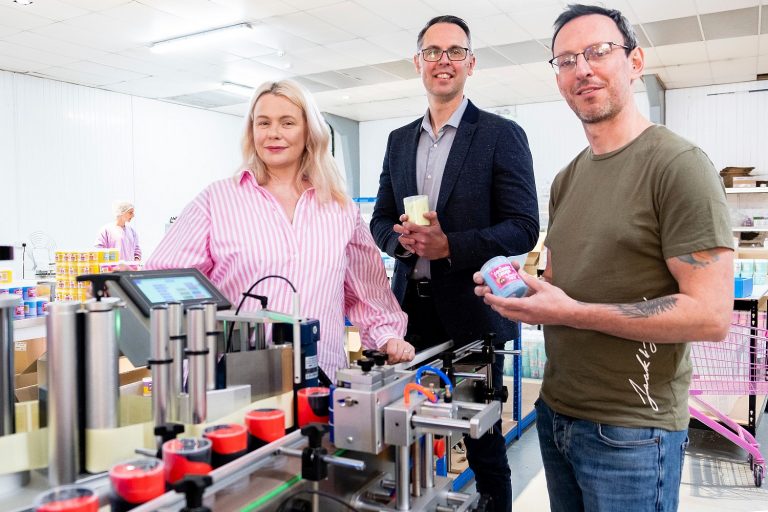Opportunity Goole, one of eight projects that make up the Goole Town Deal regeneration programme, has launched a grant funding scheme that both individuals and organisations can apply to.
Grants of up to £50,000 are now available for projects designed to enhance the local economy in some way, and that they wouldn’t have been able to access the funding elsewhere. The grant scheme will be open to organisations initially and will then begin to accept applications from individuals soon afterwards. Opportunity Goole Project Manager Dawn Redfern said: “The eligibility criteria is deliberately very broad and the grant scheme is open to anyone over the age of 16 in the Goole area. The main requirement is that the grants should be used to boost the local economy in some way. So, for example, an organisation may want to apply for grant funding to pay for some training for its workforce. “Meanwhile, an individual could apply for funding towards transport costs to help them secure employment or give them access to training. However, if applicants can access the funding they need elsewhere, we’ll signpost them to that instead. The idea is that the Opportunity Goole grant scheme provides financial support that people can’t find elsewhere.” Phil Jones, Chairman of the Goole Town Deal Board, welcomed the launch of the Opportunity Goole grant scheme, adding: “Since its launch earlier this year, Opportunity Goole has already delivered some really positive outcomes for both individuals and employers. The launch of this new grant scheme is a really positive step because it has been designed to fill a gap in existing provision so the criteria is very broad and flexible. Even if you’re unsure whether you’d be eligible to apply, it’s well worth emailing the team or popping in to Goole Library to see them and talk your ideas through.” Members of the Opportunity Goole team are also be able to help and advise applicants with their grant funding applications. Anyone who would like to apply or find out more is asked to email the team at: opportunity.goole@eastriding.gov.uk. Members of the Opportunity Goole team are based within Goole Library on Carlisle Street in the town centre and both local residents and businesses/employers looking for free support are welcome to drop in and see them or can email in advance to pre-book an appointment. Billed as a ‘one-stop shop’, Opportunity Goole provides easy access to information about local job opportunities, training provision, business support and more to anyone over the age of 16 years, regardless of whether they’re employed, unemployed or retired. The team can also help people to access information about Goole Town Deal and workforce development, helping individuals to gain the knowledge and skills they need to secure employment and ensuring that employers can recruit local people with the skillset that they’re looking for. For more information about Opportunity Goole and the other projects funded by Goole Town Deal, visit www.gooletowndeal.co.uk.Pudsey site sold for new homes
Keyland Developments Ltd, the property trading arm of Kelda Group and sister-company to Yorkshire Water, has sold a site in Pudsey, West Yorkshire to Leeds Federated Housing Association for the delivery of 54 new homes.
Keyland secured outline planning consent from Leeds City Council for the new homes under a Planning Promotional Agreement (PPA) with a local landowner in 2021. The site was marketed with the benefit of outline planning permission and a suite of technical information by Keyland and the Leeds office of Cushman & Wakefield.
The transaction represents Keyland’s first completed PPA sale in which they acted as Land Promoter as well as joint owner with the neighbouring landowner. The PPAs involve Keyland working with independent landowners, corporates, and regulated bodies to overcome obstacles to development on strategic sites to facilitate development by securing planning consent for future use. The Pudsey PPA followed on from agreements with landowners in Wakefield, Leeds, and Calderdale.
The 5.5-acre site is located in an established and popular residential area mid-way between the centres of Leeds and Bradford, adjacent to Owlcotes Reservoir on Owlcotes Road.
Matthew Turnbull, land & planning manager at Keyland Developments Ltd, said: “We are delighted to have completed our first PPA sale with this site.
“The purpose of our PPA agreements is to align our interests with those of the landowner, and it enables landowners of any scale to maximise the potential from their sites without incurring any risk or cost to themselves.
“The planning consent and subsequent sale to Leeds Federated Housing Association has facilitated new homes to contribute to the local authority’s long-term housing targets.”
Phil Roebuck, partner at Cushman & Wakefield who acted for Keyland in the land sale, said: “The unlocking of this site in a highly sustainable location has enabled the delivery of new homes at a time when regional shortages are well documented. The new development will complement its surroundings and benefit from nearby amenities, services, and transport.”
Two new deals complete at historic Yorkshire mill complex
Guernsey’s oldest veterinary practice joins York’s VetPartners
New raft of skills bootcamps aims to help up to 800 people
HEYLEP to support Hull businesses with Export Growth Grant funding programme
Bradford banking group acquires money-saving app
Coatings firm secures funds for expansion
West Yorkshire towns join forces to maximise region benefits from tourism sector
Significant progress made on Sleaford industrial park
Carbon capture in the Humber gets green light from Government alongside new oil and gas licences
British Steel gets BSI approval to sustainability standard
Short run printing and booklets for changing customer needs
Axiologik bolsters leadership team with hat-trick of hires
Leeds-headquartered digital transformation specialist Axiologik has made a trio of senior hires as the business pursues further growth.
Finance director Ross MacGregor is the first addition to the leadership team. While new to the tech sector, he joins Axiologik with almost a decade of experience in CFO and FD roles within fast-growth businesses across Yorkshire. A Yorkshire Finance Leaders award winner, his background spans supply chain, retail, construction, and manufacturing industries, to name a few, with his most recent role being to support an ambitious start-up in Australia.
Newly-appointed head of people Sarah Bright is another critical hire, as Axiologik’s total headcount now tops 110 colleagues nationwide. Sarah’s impressive CV spans almost 25 years in a variety of HR roles — including a 13 year stretch at renowned brand, Hallmark. More familiar with the tech sector in recent years, this piqued her interest when this fresh position became available at Axiologik.
Commercial director Rob Smith completes the line-up. A Yorkshireman who has lived in London for 30 years, his background spans a range of senior positions. His maths degree took him into technical roles, first into a systems developer role for Kodak, and later to European Engineering Director for Sila Communications — a Reuters’ company.
Since then, his career has seen him become increasingly commercial, including MD of the pioneering agile consultancy IndigoBlue, which he led from inception through growth and subsequent sale. He has remained immersed in the strategic technology space, and has now returned to work alongside familiar and highly-respected faces at Axiologik.
Commenting on joining the team, Rob said: “Axiologik’s reputation for delivering significant transformational change projects, is now well established — particularly in the North. As our capabilities continue to improve with growth in the team, this is the perfect time to position the business as a strategic change enabler, nationally, whether we’re helping a private or public sector client create impact, build resilience, or drive value.”
Sarah added: “This is a fantastic time to join our business. Axiologik has quickly earned its stripes as a disruptive founder-led brand that is really starting to be recognised across a range of industries.
“With an ambitious growth trajectory — and passionate about the employee experience — the board has empowered me to quickly evaluate our people strategies, ask questions, gain insights, identify opportunities, and lead on the delivery of our future plan — a fulfilling challenge where I know I can add value to colleagues and associates.”
Ben Davison, Axiolgik’s director, concluded: “Welcoming Ross, Sarah and Rob to the team, is a signal of the calibre of people within our business and continued growth. We are being increasingly invited to partner with some of the country’s most well-known organisations as they embark upon mission critical projects, and with such an exciting growth trajectory, the strength in our leadership team is key.”
Training company takes 10,000 sq ft for new learning hub in Morley
Flourishing creative sector sees West Yorkshire job growth
Barnsley sensory slime sensation sets sights on international expansion
A self-confessed accidental entrepreneur, who became one of the UK’s leading manufacturers of colourful sensory putty, has secured a match-funded grant from the South Yorkshire Business Productivity Programme to help her unique business target future growth in international markets.
Ruby Sheldon launched her Carlton-based business Slime Party UK in 2018. Inspired by her daughter, who wanted to celebrate her birthday by inviting her friends to make slime together, Ruby decided to take matters into her own hands and began developing her slime making workshops.
The party proved to be an instant hit, and Ruby started receiving requests from other parents to host similar events. Sensing a small business opportunity Ruby decided to advertise her unique slime parties on a social media platform.
Within just a month, Ruby had secured party bookings for a full 12 months. As she began experimenting with new ways of making colourful, scented and sensory slime, she started selling her products online. When the Covid-19 pandemic forced Ruby to suspend her slime parties, she spent time developing her own unique compound, a sensory putty with a butter-slime texture designed to be thick and easy to hold, but also the perfect texture for stretching, squashing and encouraging sensory play.
Her unique products quickly caught the eye of national retailer Toymaster, and today Slime Party UK produces over 4,000 tubs of Ruby’s unique sensory putty each week. With demand for her services growing quickly, Ruby expanded her business, combining a manufacturing facility and colourful shop in Barnsley which opened its doors earlier this year.
With plans to expand her business internationally, Ruby knew that she needed to re-think the way her sensory putties were manufactured, enabling her to increase production to meet future demands and she decided to contact Enterprising Barnsley for help.
Working with key account manager Paul Johnson, Ruby secured funds through the South Yorkshire Business Productivity Programme, a match funded ERDF grant scheme, to enable her to automate her packaging processes. The funds helped Slime Party UK to invest in a labelling machine, allowing labels to be added to her pots of sensory putty automatically, rather than relying upon members of staff physically labelling her products.
The machinery helped to free up the time of two of her 13-strong workforce, enabling production capacity to increase, and since installing the new equipment, Slime Party UK has started to forge an international distribution network and even exhibited at trade shows in North America. The additional capacity created within the business has also enabled Ruby and her team to start developing a new range of sensory putties, and the company is also planning to release a range of gift sets in the near future.
Ruby Sheldon, Managing Director, Slime Party UK, said: “When my daughter started getting interested in slime, I thought it would be a fairly short-lived fad, but I was genuinely amazed by the reactions my parties received and just how much they were in demand. As I delved more into the science behind slime, I began to realise the importance of sensory play in childhood development.
“During the Covid-19 pandemic, we were unable to host the regular parties that I had built my business around and so I began developing my own sensory putties. We launched them in 2021 and since that time the business has gone from strength to strength. We’re planning to expand internationally later this year, but our products were already in high demand, so I wanted to explore ways of improving the way our manufacturing processes.
“From my very early days of trading, I’ve worked closely with the Enterprising Barnsley team: initially, through the Launchpad business support programme, which helped me to understand how to run a business, and they have also provided help and assistance as the business has grown and evolved.
“One of the barriers we faced was the way each tub of slime was packaged. I knew that automating part of the production process could help, but the costs of purchasing the machinery were inhibitive. Paul suggested that I should apply to the Business Productivity Programme, and since securing the funds, it has helped to transform the business. I’ve really enjoyed working with Paul and he’s been very supportive of our plans and he always goes the extra mile when it comes to helping us.”
Paul Johnson, key account manager, Enterprising Barnsley, said: “Although there are very few businesses out there who specialise in making sensory putties, like many businesses working in the manufacturing sector, Slime Party UK realised that to increase production, additional investment was required.
“Ruby realised that employing two members of staff to stick labels on her completed products was causing something of a bottleneck in her production line and realised that if the process was automated, her workforce could be used more effectively.
“Ruby has worked closely with Enterprising Barnsley since she first began developing her ideas, and it’s great to see how the business has grown and evolved over the past five years.
“The Business Productivity Grant scheme was developed to help businesses across South Yorkshire to overcome barriers to growth, and for Slime Party UK this meant being able to free up staff, which will help the business to increase its current production levels. Through the distribution network Ruby has forged, children across the world are enjoying Slime Party’s unique products, and I am looking forward to seeing how the business will develop in the future.”





















